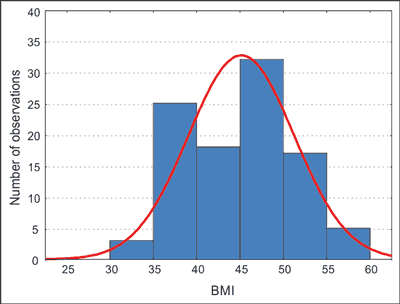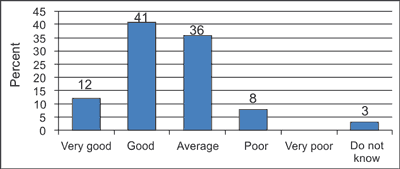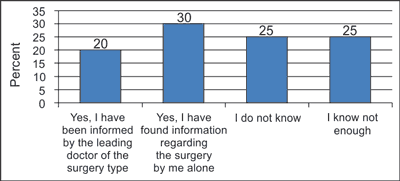Magda Koc1, *Regina Sierzantowicz2, Lech Trochimowicz1-3, Bozena Kirpsza2, Piotr Szwedzinski5, Michal Kucap5, Krystyna Lapuc-Seweryn3, Klaudiusz Nadolny4, 5, Jerzy Robert Ladny4, Hady Razak Hady3
Evaluation of patients’ knowledge about perioperative recommendations after bariatric procedures
Ocena poziomu wiedzy w zakresie zaleceń okołooperacyjnych wśród pacjentów poddawanych zabiegom bariatrycznym
1Operating Block, Medical University of Bialystok, Poland
2Department of Surgical Nursing, Medical University of Bialystok, Poland
31st Department of General and Endocrine Surgery, Medical University of Bialystok, Poland
4Department Emergency Medicine and Disaster, Medical University of Bialystok, Poland
5Voivodeship Rescue Service in Katowice, College of Strategic Planning in Dabrowa Gornicza, Poland
Streszczenie
Wstęp. Zabiegi bariatryczne stanowią alternatywę u chorych z otyłością, którzy nie reagują na konwencjonalne metody redukcji masy ciała. W literaturze brak analiz dotyczących wpływu poziomu wiedzy pacjentów na postępowanie okołooperacyjne.
Cel pracy. Ocena wiedzy pacjentów poddawanych zabiegom bariatrycznym w zakresie postępowania okołooperacyjnego, przestrzegania diety oraz zalecanej aktywności fizycznej.
Materiał i metody. Badania zostały przeprowadzone losowo wśród 100 pacjentów kwalifikowanych do zabiegów bariatrycznych, za pomocą anonimowego kwestionariusza ankietowego konstrukcji własnej, oceniającego poziom wiedzy w zakresie przygotowania do zabiegu i postępowania pooperacyjnego. Analiza dokumentacji medycznej polegała na uzyskaniu informacji o aktualnych lub przebytych chorobach współistniejących z otyłością, lekach, które pacjent przyjmował, oraz ocenie podstawowych parametrów życiowych. Uzyskano zgodę komisji bioetycznej Uniwersytetu Medycznego w Białymstoku oraz pisemne zgody pacjentów.
Wyniki. BMI w ankietowanej grupie wynosiło średnio 45,15 ± 6,11. Badani oceniali wiedzę w zakresie postępowania okołooperacyjnego, grupa 41 pacjentów (41%) uznała, że poziom wiedzy jest dobry. Nie stwierdzono istotnych statystycznie różnic w poziomie wiedzy w zakresie postępowania okołooperacyjnego, przestrzegania diety, aktywności fizycznej u mężczyzn i kobiet. Stwierdzono natomiast istotną statystycznie (p < 0,05) dodatnią korelację (r = 0,2197) między wiekiem chorych a poziomem ich wiedzy. Wraz z wiekiem wzrastało poczucie posiadania większej wiedzy w omawianym zakresie.
Wnioski. Przygotowanie i wdrożenie programu edukacyjnego w zakresie zaleceń dotyczących m.in. przygotowania się do zabiegu, zalecanej diety, zalecanej aktywności fizycznej, częstotliwości wizyt kontrolnych, zapobiegania powikłaniom pooperacyjnym wśród pacjentów leczonych bariatrycznie pozwoli uzupełnić wiedzę i przyspieszyć proces redukcji masy ciała.
Summary
Introduction. Bariatric procedures are an alternative in obese patients who do not respond to conventional methods of weight reduction. There are no analyzes in the literature regarding the influence of patients’ knowledge on perioperative proceedings.
Aim. Assessment of the knowledge of patients undergoing bariatric procedures in the area of perioperative proceedings, following diet and recommended physical activity.
Material and methods. The research has been conducted randomly, among 100 patients qualified for bariatric procedures, using an anonymous questionnaire of own design, assessing the level of knowledge in the field of preparation for surgery and post-operative procedure. The analysis of medical documentation consisted of obtaining information about current or past diseases coexisting with obesity, the medicines the patient was taking and the assessment of basic life parameters. The consent of the bioethical committee Medical University of Bialystok, as well as written consent from all the subject.
Results. BMI in examined group was on average 45.15 ± 6.11. The examined patients assessed knowledge in the area of perioperative proceedings, group 41 (41%) considered that the level of knowledge is good. There were no statistically significant differences in the level of knowledge regarding perioperative proceedings, following the diet and physical activity in men and women. However, a statistically significant (p < 0.05) positive correlation (r = 0.2197) between the age of the patients and the level of their knowledge has been found. The sense of having more knowledge in the discussed area increased with age.
Conclusions. Preparation and implementation of an educational program including recommendations regarding among others preparation for the procedure, recommended diet, recommended physical activity, frequency of follow-up visits, prevention of post-operative complications among patients treated bariatrically would allow to complete knowledge and accelerate the process of weight reduction.

Introduction
In 1991, the World Health Organization (WHO) classified obesity to systemic diseases, which is why the problem of obesity began to be perceived not only in psychological and social terms, but also in medical terms. The number of people with obesity in whom the body mass index (BMI) is ≥ 30 kg/m2, in the years 2000-2005 has tripled, whereas with BMI ≥ 40 has doubled (1). In Poland, the current prevalence of overweight and obesity among the Polish population was 36.54 and 13.34%, respectively (http://www.who.int/bmi).
The main causes of obesity are genetic, physiological, psychological and environmental factors related to lifestyle (2). Obesity is the cause of many metabolic, endocrine, psychological disorders, lung ventilation, changes in the circulatory and osteoarticular systems, with the immediate life threat (risk of mechanical injury, more malignant course of infection, heart failure and respiration) and indirect risk resulting from obesity complications (type 2 diabetes, dyslipidemia, complications of hypertension and atherosclerosis, etc.) (3). Bariatric procedures are an alternative in obese patients who do not respond to conventional methods of weight reduction, such as compliance with a low-calorie diet and increased physical activity (4, 5). There are studies in the literature confirming the impact of diet (6), physical activity (7) on the effects of bariatric surgery and weight reduction. However, there are no studies on the impact of patients’ level of knowledge on perioperative proceedings.
Aim
The aim of the study was to assess the knowledge of patients undergoing bariatric procedures in perioperative proceedings, following the diet and recommended physical activity.
Material and methods
The research has been conducted randomly, among 100 patients qualified for bariatric procedures, using an anonymous questionnaire of own design, assessing the level of knowledge in the field of preparation for surgery and postoperative procedures in the 1st Department of General and Endocrinological Surgery, University Hospital in Bialystok.
The analysis of medical documentation of patients undergoing bariatric procedures consisted in obtaining information about current or previous diseases coexisting with obesity, the medicines the patient was taking and the basic vital parameters (i.e. heart rate, blood pressure) of the patient, both, before and after the procedure. The questionnaire is built in two parts. Part I (personal information) consisted of 10 questions regarding the age of the respondents, gender, body weight, height, place of residence, and education. Part II contains proper questions, precisely related to the subject of the study. The respondents were informed about ensuring full anonymity and the need to self-solve the survey. The consent of the bioethical committee Medical University of Białystok, as well as written consent from all the subject.
Statistical analysis
The analysis of the results has been conducted using the statistical software STATISTICA for Windows 11.0. The results of the survey have been presented using descriptive statistics tables, tables of cardinality and charts. The relations of the results of self-assessment of the knowledge on the perioperative proceedings, following the diet and physical activity depending on the gender, have been analyzed by Mann Whitney’s U test. The dependence of the results of the self-assessment of the knowledge in the discussed field on the age has been analyzed by estimating the Spearman rank correlation coefficients. The test probability has been assumed to be significant at p < 0.05 and test probability at p < 0.01 has been considered highly significant. The tests have been approved by the Bioethical Commission.
Results
The study randomly included 100 patients qualified for bariatric surgery in the 1st Department of General and Endocrinological Surgery at the University Hospital in Bialystok, aged from 25 to 56 ± 10.2. The proportion of men and women in the research has been similar, slightly larger group of respondents (54%) were men. Most often bariatric procedures have been performed in the group of patients 41-45 years (35%) and 31-35 years (21%). The group of patients operated after the age of 50 was 8%. Among the co-morbidities, hypertension was related to 64 (51.2%), diabetes 19 (15.2%), ischemic heart disease 13 (10.4%) of patients. 40% of patients had secondary education. Most often, the respondents decided to undergo surgery due to health problems (tab. 1).
Tab. 1. Characteristics of examined group
| Characteristics of group | Number | Percent of response |
| Women/men | 46/54 | 46/54 |
Age/years:
– 25-30
– 31-35
– 36-40
– 41-45
– 46-50
– > 50 |
10
21
17
35
9
8 |
10
21
17
35
9
8 |
Education:
– vocational
– secondary
– higher |
24
40
36 |
24
40
36 |
The reason for undergoing the surgery:
– family persuasion
– health issues
– negative estimation of one’s own look |
20
41
39 |
20
41
3 |
Co-morbidities:
– hypertension
– diabetes
– ischemic heart disease
– schizophrenia
– cancer
– none |
64
19
13
1
1
27 |
51.20
15.20
10.40
0.80
0.80
21.60 |
The average body mass in the examined group of patients was 133.3 ± 20.7; an increase of 1.72 ± 0.9, while the BMI in the surveyed group was on average 45.15 ± 6.11 (fig. 1).

Fig. 1. BMI in examined group of patients
The most frequently performed surgical procedure in the examined group has been sleeve gastrectomy (51%), gastric banding has been applied in 34% of respondents, and the Roux-en-Y method has been used in 15% of the respondents (tab. 2).
Tab. 2. The type of bariatric procedure in examined group of patients
| The type of bariatric procedure | Number | Percent |
| Laparoscopic adjustable gastric banding (LAGB) | 34 | 34.00 |
| Sleeve gastrectomy (SG) | 51 | 51.00 |
| Roux-en-Y gastric banding (RYGB) | 15 | 15.00 |
The examined patients assessed the knowledge on perioperative proceedings. The most numerous group 41 (41%) considered that the level of knowledge is good (fig. 2).

Fig. 2. Evaluation of the knowledge on perioperative proceedings in examined group of patients
Respondents most often found information about the nature of various bariatric operations 30 (30%), and 20 (20%) of the subjects received information about the procedure from the physician (fig. 3).

Fig. 3. Ways of acquiring information about the essence of bariatric operations
Powyżej zamieściliśmy fragment artykułu, do którego możesz uzyskać pełny dostęp.
Mam kod dostępu
- Aby uzyskać płatny dostęp do pełnej treści powyższego artykułu albo wszystkich artykułów (w zależności od wybranej opcji), należy wprowadzić kod.
- Wprowadzając kod, akceptują Państwo treść Regulaminu oraz potwierdzają zapoznanie się z nim.
- Aby kupić kod proszę skorzystać z jednej z poniższych opcji.
Opcja #1
29 zł
Wybieram
- dostęp do tego artykułu
- dostęp na 7 dni
uzyskany kod musi być wprowadzony na stronie artykułu, do którego został wykupiony
Opcja #2
69 zł
Wybieram
- dostęp do tego i pozostałych ponad 7000 artykułów
- dostęp na 30 dni
- najpopularniejsza opcja
Opcja #3
129 zł
Wybieram
- dostęp do tego i pozostałych ponad 7000 artykułów
- dostęp na 90 dni
- oszczędzasz 78 zł
Piśmiennictwo
1. WHO: Obesity: preventing and managing the global epidemic. Report of a WHO Consultation. WHO Technical Report Series 894. World Health Organization, Geneva 2000.
2. Wyatt SB, Winters KP, Patricia M: Overweight and obesity: prevalence, consequences, and causes of a growing public health problem. Bariatric Surgery 2006; 331(4): 166-174.
3. Sullivan PW, Ghushchyan VH, Ben-Joseph R: The impact of obesity on diabetes, hyperlipidemia and hypertension in United States. Qual Life Res 2008; 17: 1063-1071.
4. Dąbrowiecki S: Zasady kwalifikacji chorych z otyłością olbrzymią do leczenia operacyjnego. Post Nauk Med 2009; XXII: 502-505.
5. Sowemimo OA, Yood SM, Courtney J et al.: Natural history of morbid obesity without surgical intervention. Surg Obes Relat Dis 2007; 3: 73-77.
6. Dagan SS, Keidar A, Raziel A et al.: Do bariatric patients follow dietary and lifestyle recommendations during the first postoperative year? Obes Surg 2017. DOI: 10.1007/s11695-017-2633-6.
7. Nijamkin MP, Campa A, Sosa J et al.: Comprehensive nutrition and lifestyle education improves weight loss and physical activity in Hispanic Americans following gastric bypass surgery: a randomized controlled trial. J Acad Nutr Diet 2012; 112(3): 382-390.
8. Befort CA, Nazir N, Perri MG: Prevalence of obesity among adults from rural and urban areas of the United States: Findings from NHANES (2005-2008). J Rural Health 2012; 28: 392-397.
9. Kulick D, Hark L, Deen D: The bariatric surgery patient: a growing role for registered dietitians. J Am Diet Assoc 2010; 110(4): 593-599.
10. Gloy VL, Briel DL, Kashyap SR et al.: Bariatric surgery versus non-surgical treatment for obesity: a systematic review and meta-analysis of randomized controlled trials. BMI 2013; 22: 347. DOI: 10.1136/bmj.f5934.
11. Sheng B, Truong K, Spitler H et al.: The Long-Term Effects of Bariatric Surgery on Type 2 Diabetes Remission, Microvascular and Macrovascular Complications, and Mortality: a Systematic Review and Meta-Analysis. Obes Surg 2017. DOI: 10.1007/s11695-017-2866-4.
12. Sierżantowicz R, Hady RH, Kirpsza B et al.: Preparation for bariatric surgery for patients with morbid obesity. Pielęg Chir Angiol 2012; 3: 105-108.
13. Ahmed S, Morrow E, Morton J: Perioperative considerations when operating on the very obese: tricks of the trade. Minerva Chir 2010; 65: 667-675.
14. Głuszek S: Early and remote consequences undesirable in surgical obesity treatment. Post Nauk Med 2009; 7: 514-523.
15. Petcu A: Comprehensive Care for Bariatric Surgery Patients. AACN Adv Crit Care 2017; 28(3): 263-274.



